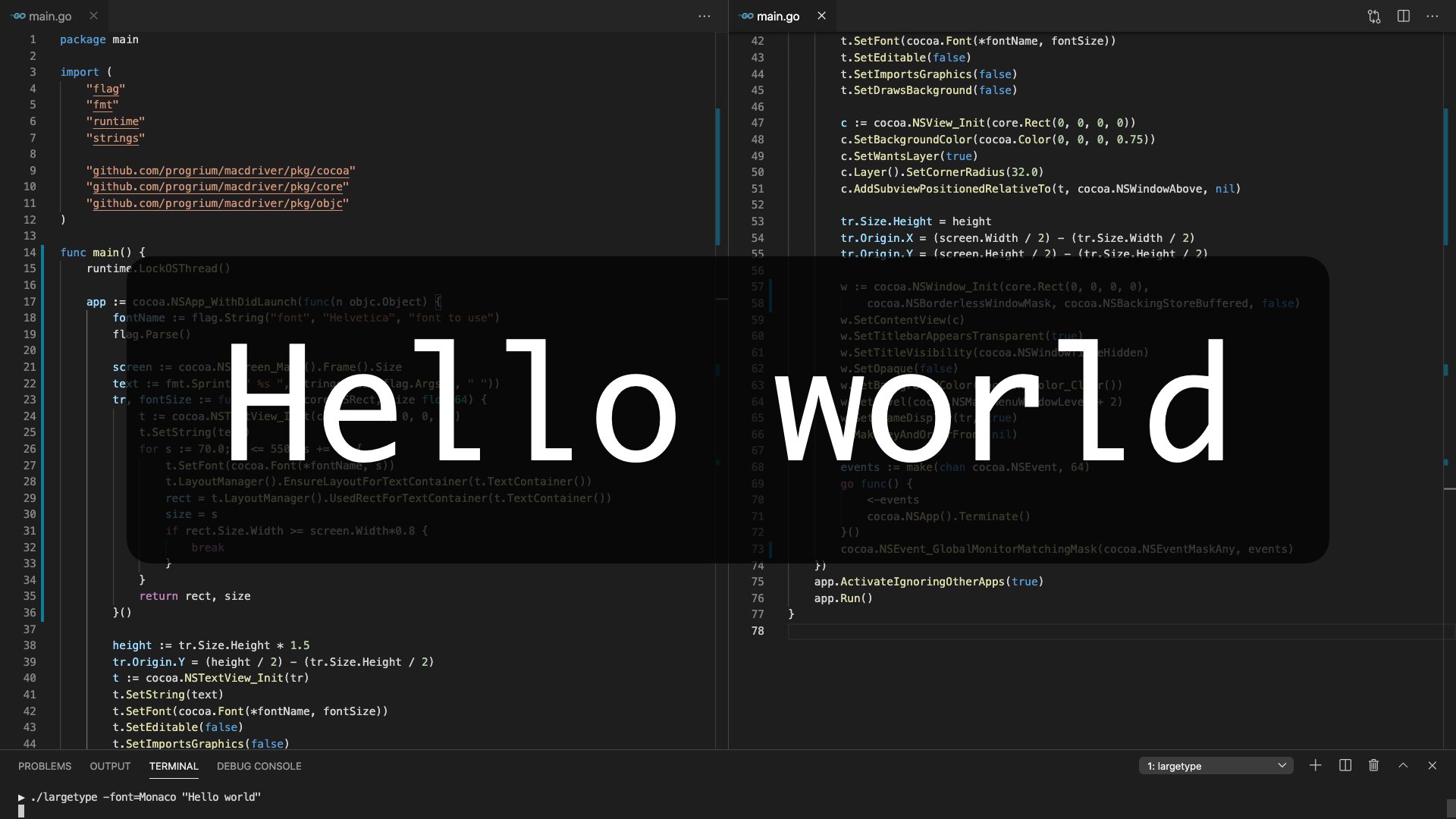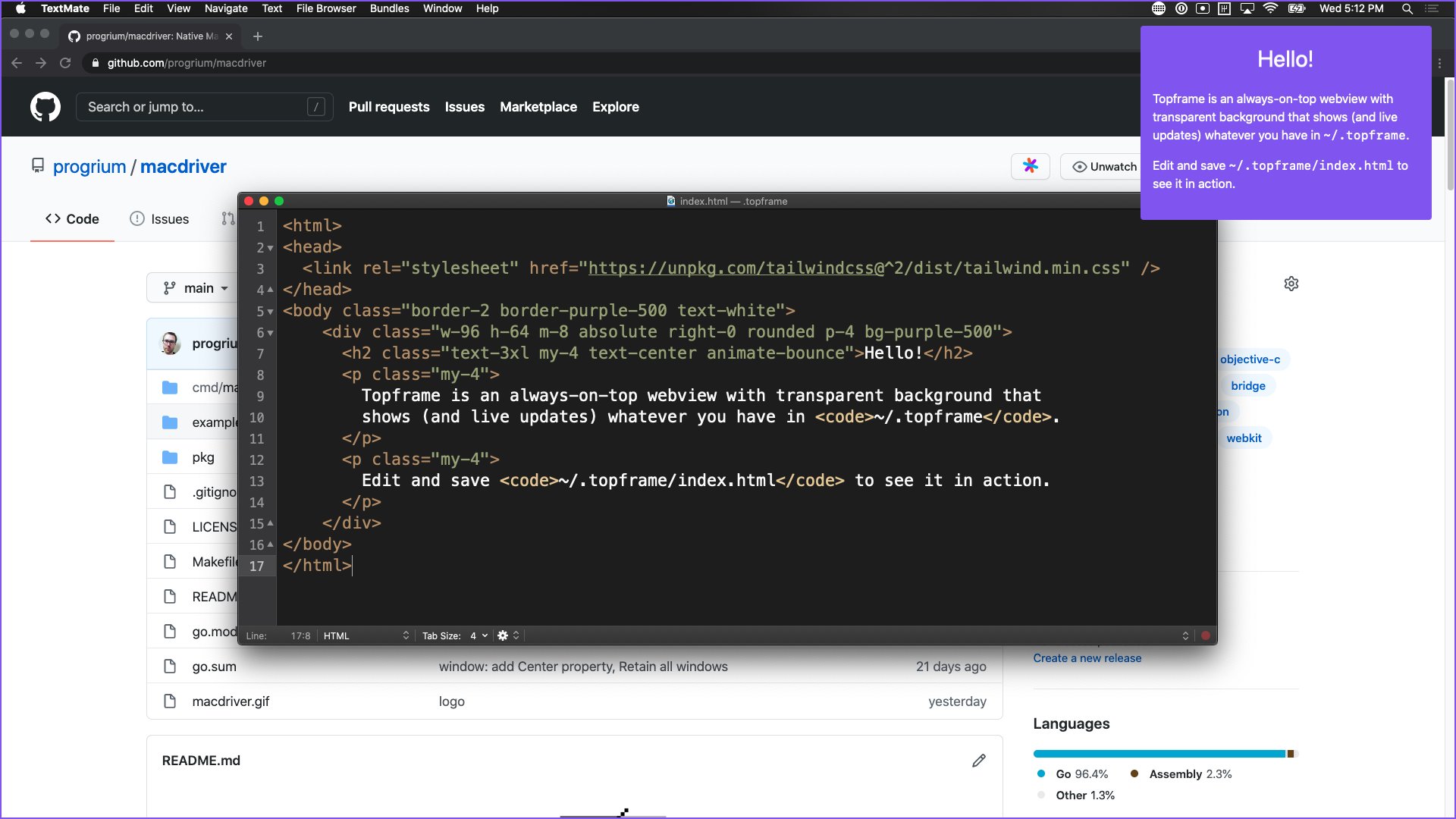Native Mac APIs for Golang!
MacDriver is a toolkit for working with Apple/Mac APIs and frameworks in Go. It currently has 2 parts:
The objc package wraps the Objective-C runtime to dynamically interact with Objective-C objects and classes:
cls := objc.NewClass("AppDelegate", "NSObject")
cls.AddMethod("applicationDidFinishLaunching:", func(app objc.Object) {
fmt.Println("Launched!")
})
objc.RegisterClass(cls)
delegate := objc.Get("AppDelegate").Alloc().Init()
app := objc.Get("NSApplication").Get("sharedApplication")
app.Set("delegate:", delegate)
app.Send("run")- Access any class or method you can access in Objective-C
- Common object convenience methods: Get, Set, Alloc, Init, ...
- Create and extend classes at runtime that can be used by Objective-C code
- Retain and Release methods for working with Objective-C memory management
The cocoa, webkit, and core packages wrap objc with wrapper types for parts of the Apple/Mac APIs. They're being added to as needed by hand until
we can automate this process with schema data. These packages effectively let you use Apple APIs as if they were native Go libraries, letting
you write Mac applications (potentially also iOS, watchOS, etc) as Go applications:
func main() {
app := cocoa.NSApp_WithDidLaunch(func(notification objc.Object) {
config := webkit.WKWebViewConfiguration_New()
wv := webkit.WKWebView_Init(core.Rect(0, 0, 1440, 900), config)
url := core.URL("http://progrium.com")
req := core.NSURLRequest_Init(url)
wv.LoadRequest(req)
w := cocoa.NSWindow_Init(core.Rect(0, 0, 1440, 900),
cocoa.NSClosableWindowMask|
cocoa.NSTitledWindowMask,
cocoa.NSBackingStoreBuffered, false)
w.SetContentView(wv)
w.MakeKeyAndOrderFront(w)
w.Center()
})
app.SetActivationPolicy(cocoa.NSApplicationActivationPolicyRegular)
app.ActivateIgnoringOtherApps(true)
app.Run()
}- 1:1 mapping of API names with Objective-C APIs
- Cocoa types: NSApplication, NSImage, NSMenu, NSWindow, more ...
- Webkit types: WKWebView and configuration classes
- Core types: NSData, NSDictionary, NSNumber, NSPoint, NSRect, NSSize, NSString, NSURL, more ...
- Core also allows dispatching Go functions in the Cocoa run loop
- Many constants/enums are defined
examples/largetype - A Contacts/Quicksilver-style Large Type utility in under 80 lines:
examples/pomodoro - A menu bar pomodoro timer in under 80 lines:

examples/topframe - An always-on-top webview with transparent background in 120 lines [requires Go 1.16+]:
NEW: See progrium/topframe for a more fully-featured standalone version!
Eventually we can generate most of the wrapper APIs using bridgesupport and/or doc schemas. However, the number of APIs is pretty ridiculous so there are lots of edge cases I wouldn't know how to automate yet. We can just continue to create them by hand as needed until we have enough coverage/confidence to know how we'd generate wrappers.
The original objc and variadic packages were written by Mikkel Krautz. The variadic package is some assembly magic to make everything possible since libobjc relies heavily on variadic function calls, which aren't possible out of the box in Cgo.
MIT





